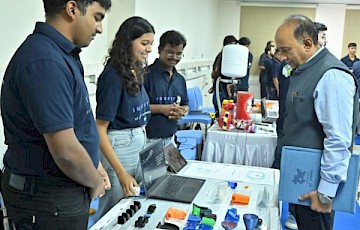4 April 2017
Aditi Singhal Receives DST-SERB Extra Mural Research Award for Developing an Efficient Catalyst For Water Splitting to Generate Clean Energy

Assistant Professor at the School of Engineering and Applied Science Aditi Singhal recently received the DST-SERB Extra Mural Research Award for three years for her study, Nanocrystalline substituted cobalt-based metal oxides for oxygen evolution reaction: A prerequisite for photochemical water splitting. Professor Singhal is designing more advanced cobalt-based metal oxides and substituting them with transition metals for the electrocatalysis of water to bridge the global energy supply between the present era of fossil fuels and the future era based on the hydrogen economy. Arnab Dutta from IIT Gandhinagar is the Co-PI on the project. Professor Singhal said, "Electrocatalysts that will evolve hydrogen with the lowest possible energy consumption will be very important to bridge the global energy supply between the present era of fossil fuels and the future era based on the hydrogen economy. Water splitting, however, is controlled by a difficult oxygen evolution reaction (OER) step because it involves 4 electrons and 4 protons transfer. If an efficient catalyst for OER could be developed, hydrogen can be produced efficiently by combining the catalyst with a solar device. This way, oxygen and hydrogen can be generated without harming the environment."
In this context, the current project focuses on designing more advanced cobalt-based metal oxides and substituting them with transition metals. The researchers have chosen cobalt oxide-based materials because they are economical and have shown promising activity toward OER recently. Prepared materials will be used as OER electrocatalysts with the aim of getting higher catalytic activity in terms of low overpotential and high current density. The catalytic OER, on the one hand, will give oxygen. On the other, it will also provide a cost-effective route for clean, renewable hydrogen fuel, which will be able to reduce our dependence on fossil fuels and also result in minimising environmental pollution.



